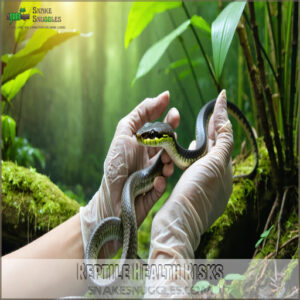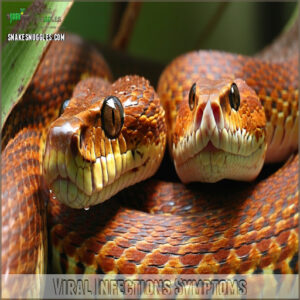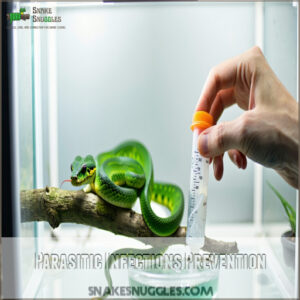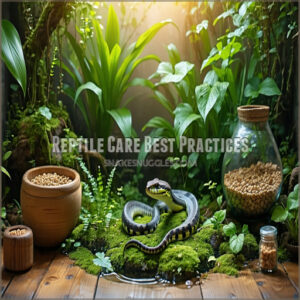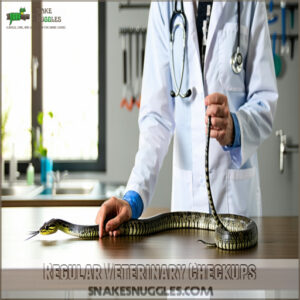This site is supported by our readers. We may earn a commission, at no cost to you, if you purchase through links.

Keep their enclosure spotless by cleaning regularly and disinfecting tools, and feeding them a balanced diet helps reduce stress, keeping their immune system strong.
Quarantine any new reptiles to avoid spreading illnesses, and monitor your snake’s health by watching for signs like breathing issues or unusual behavior, which is part of giving your snake a healthy start.
Regular vet checkups are a must for catching problems early, think of it as giving your snake a healthy start to slither happily ever after.
The details? They’re worth it.
Table Of Contents
- Key Takeaways
- Reptile Health Risks
- Common Reptile Diseases
- Reptile Care Best Practices
- Disease Prevention Strategies
- Reptile Owner Responsibilities
- Frequently Asked Questions (FAQs)
- What do you do if a snake is sick?
- How do you care for reptiles?
- What do you do if a snake dies?
- Should reptile keepers keep illegally imported snakes?
- How do you treat a snake fetus?
- How do you prevent parasites in reptiles?
- How can you prevent Salmonella in reptiles?
- How can we prevent reptiles impaction?
- How do you prevent mouth rot in reptiles?
- How can I prevent respiratory infections in snakes?
- Conclusion
Key Takeaways
- Wash your hands thoroughly after handling your snake, their enclosure, or tools to prevent the spread of diseases like Salmonella.
- Keep your snake’s enclosure clean by removing waste daily, disinfecting surfaces regularly, and maintaining proper temperature and humidity.
- Quarantine new reptiles and follow up with regular vet checkups to catch health issues early and stop infections from spreading.
- Monitor your snake’s behavior and physical condition for signs of illness, like difficulty breathing or unusual activity, and act quickly with veterinary care.
Reptile Health Risks
You’ll need to protect your pet reptile from common health threats like Salmonella, infections, and parasites that can make both you and your snake sick.
Your snake’s health depends on proper handling, regular cleaning, and careful monitoring of symptoms, which will help you catch potential problems early and keep your scaly friend thriving, with a focus on proper handling.
Salmonella Transmission
Did you know that 6% of human salmonella infections come from reptile contact?
When handling reptiles, germs spread easily through their environment, making contamination risk a serious concern.
Your snake can be a disease vector for bacterial transfer even without showing symptoms.
For effective reptile disease prevention, always wash hands after contact and keep their food prep area separate from yours.
This simple step prevents salmonella infection.
Understanding pet reptile risks is essential for preventing the spread of disease to humans.
Bites and Scratches Prevention
While Salmonella stays invisible, bites and scratches from reptiles are risks you can spot right away.
Your reptile friend mightn’t mean harm, but knowing proper Bite First Aid and Scratch Prevention makes all the difference.
Here’s your safety playbook:
- Never handle reptiles when they’re shedding or eating
- Use proper snake hooks and tongs for safer handling
- Watch for defensive postures – they’re warning signs
- Keep a first aid kit nearby with antiseptic solutions
- Document any incidents for your vet’s reference
Handwashing Importance
Proper hand washing stands at the front line of reptile disease prevention.
After handling your scaly friend, head straight to the sink and use warm water with soap for at least 20 seconds.
Scrub thoroughly – front, back, between fingers, and under nails.
Can’t reach a sink? Hand sanitizers with 60% alcohol offer temporary germ removal until you can wash up properly.
Regular reptile sanitation practices are essential for preventing the spread of diseases to your pet.
Cleaning Enclosures
After washing your hands, focus on reptile enclosure cleaning to prevent illnesses.
Use dedicated cleaning supplies and sanitize equipment like water bowls or hides.
For better waste management, remove droppings daily and change bedding often.
Disinfecting surfaces is part of proper enclosure maintenance.
Stick to reptile hygiene practices to prevent diseases and support reptile health monitoring while ensuring reptile parasite prevention.
Maintaining proper snake enclosure cleanliness is essential for preventing the spread of diseases and promoting a healthy environment for your pet.
Common Reptile Diseases
Reptiles can suffer from a variety of illnesses, including septicemia, viral and bacterial infections, and parasitic diseases.
Recognizing symptoms early and providing proper care can make a huge difference in preventing these common health problems, particularly through proper care.
Septicemia Causes
Septicemia in reptiles often sneaks in after trauma risks, bacterial infections, parasite infection, or poor hygiene compromise their health.
Stress factors and immune suppression make your pet more vulnerable.
Untreated infections can lead to septicemia in snakes.
Look out for breathing issues, lethargy, or red spots on the skin.
Prioritize snake disease prevention with clean habitats and swift treatment to stop this potentially fatal reptile snake disease.
Viral Infections Symptoms
Spotting viral infections early can save your snake’s life.
Watch for lethargy, weight loss, or unusual hiding.
Respiratory issues like wheezing signal trouble.
Neurological symptoms, such as head tremors, can also appear.
To protect your pet:
- Monitor appetite and body condition.
- Check for skin discoloration.
- Look for breathing changes.
- Notice abnormal movements.
- Implement proper infection control practices.
Bacterial Infections Treatment
When treating bacterial infections in snakes, start with veterinary-assisted diagnosis through bacterial cultures.
Antibiotic therapy is key, using reptile antibiotics suited to the infection.
Clean the wound, improve hygiene, and isolate the snake to guarantee infection control.
Regular enclosure cleaning prevents reinfection.
Quick response can save lives while reducing risks of bacterial diseases.
| Step | Action | Purpose |
|---|---|---|
| Diagnosis | Bacterial Culture | Identify infection clearly |
| Treatment | Antibiotic Therapy | Fight bacterial infections |
| Hygiene | Cleaning & Isolation | Prevent reinfection |
Parasitic Infections Prevention
Parasites can quickly wreak havoc on your snake’s health if you’re not careful.
Stop infection risk with these tips:
- Quarantine new reptiles to avoid parasite transmission.
- Regularly inspect stool for signs of internal parasites like worms.
- Maintain reptile hygiene by keeping enclosures spotless.
Effective reptile parasite treatment options are available to prevent the spread of disease.
Preventive measures like these reduce parasite infestations and keep your pet thriving—because happy reptiles make happy owners!
Reptile Care Best Practices
Keeping your reptile healthy starts with consistent care, including proper hygiene, nutrition, and a well-maintained habitat.
By following these best practices, you’ll reduce the risk of diseases and create a safe environment for your pet.
Proper Hygiene Maintenance
Keeping your reptile clean prevents illness.
Always wash hands after handling snakes or cleaning enclosures.
Disinfect surfaces frequently.
Use separate tools for tank cleaning, keeping soap and disinfectant handy.
Regularly empty and clean water bowls to maintain water quality.
Snake hygiene practices help reptile illness prevention while keeping you safe.
| Task | Frequency | Tools Needed | Key Action | Why It’s Essential |
|---|---|---|---|---|
| Hand Washing | After contact | Soap, water | Scrub hands for 20 seconds | Prevents germ spread |
| Surface Disinfection | Weekly | Disinfectant, wipes | Wipe surfaces thoroughly | Kills lingering bacteria |
| Enclosure Cleaning | Monthly | Brushes, soap | Scrub walls, clean substrate | Reduces infection risks |
| Water Quality Check | Daily | Fresh water bowls | Replace dirty water | Keeps snakes hydrated and healthy |
| Health Monitoring | Ongoing | Observation | Notice unusual behavior | Catches early signs of illness |
Nutrition and Diet Planning
Meal planning is essential for reptile illness prevention.
Offer food variety to mimic natural diets and guarantee nutrient balance.
Whole prey provides complete nutrition, but dietary supplements, like calcium and Vitamin D3, may fill gaps.
Avoid malnutrition and dehydration by monitoring meals and sticking to schedules.
Balanced vitamin intake keeps your reptile’s health on track, preventing common nutritional disorders related to poor feeding, ensuring a complete nutrition.
Environmental Control Measures
A healthy snake starts with the right setup, which includes nail temperature control and humidity management to prevent illnesses.
Use proper lighting systems and monitor air quality for comfort, and don’t forget to clean enclosures regularly, which is an essential part of habitat cleaning.
Pair this with solid reptile husbandry and routine snake health monitoring for long-term care.
Effective temperature management relies on using temperature control systems to create a stable environment.
Stress Reduction Techniques
Stress reduction is essential for snake health care.
Add environmental enrichment like hides and climbing branches to keep them engaged.
Maintain proper temperature control and humidity management—small fluctuations can cause stress.
Use lighting therapy to mimic natural cycles.
Limit loud noises near their enclosure for noise reduction.
Recognizing stress in snakes is essential for effective prevention of related health issues.
Combined with reptile health care routines, these steps support snake illness prevention effectively.
Disease Prevention Strategies
Keeping your reptile healthy starts with effective disease prevention strategies that protect against infections and other health risks.
By following proper quarantine procedures, maintaining strict hygiene, and scheduling regular veterinary checkups, you can reduce the chances of illness and guarantee your pet thrives, which is the key to ensuring your reptile experiences overall wellness.
Quarantine Procedures
When bringing home a new snake, quarantine is your first step in reptile disease prevention.
Set up a separate enclosure with proper heating and hiding spots to reduce stress.
Monitor for snake illness prevention signs like unusual behavior or weight loss.
Prioritize cleanings, disease screening, and biosecurity measures.
Stick to the quarantine duration, keeping tools separate.
Isolation Techniques
Isolation helps stop the spread of diseases among snakes.
Use separate housing for sick or new reptiles to guarantee proper animal segregation.
Combine isolation with biosecurity measures like wearing gloves and disinfecting tools after handling.
Disease barriers, such as enclosures with sealed lids, protect others.
Follow snake quarantine procedures to reinforce reptile infection prevention and keep your pets safe and healthy.
Sanitation and Hygiene Protocols
Keep sickness at bay by mastering sanitation habits.
Use the right cleaning supplies and proper disinfection methods to scrub snake enclosures like a pro.
Dump tank water responsibly to nail waste management.
Always wash your hands or use hand sanitizer after handling anything reptile-related.
Biosecurity measures, like strict hygiene and reptile quarantine procedures, are your frontline defense against reptile infection prevention.
Effective reptile care involves using proper reptile cleaning supplies to maintain a healthy environment.
Regular Veterinary Checkups
Regular veterinary checkups are the backbone of reptile disease prevention.
A specialized reptile vet guarantees your snake thrives.
Stick to these steps:
- Schedule routine reptile health checks annually.
- Discuss veterinary care plans customized to your pet.
- Address disease screening for prevention.
- Monitor diet changes with veterinary consultations.
- Act promptly on snake infection prevention advice.
These steps are crucial for the overall health and well-being of your reptile, ensuring that any potential issues are identified and addressed early on.
Reptile Owner Responsibilities
Caring for your reptile means staying alert to their health and knowing the signs of common diseases.
You’re responsible for safe handling, regular checkups, and ensuring their environment supports their well-being.
Monitoring Reptile Health
Good reptile care starts with regular animal observations.
Watch for eating or activity changes—small shifts can hint at snake disease or other reptile health issues.
Build a habit of weekly health screening to catch early signs.
Veterinary guidance is critical, especially during reptile checkups.
Staying alert helps improve disease prevention and keeps your pet thriving!
Recognizing Disease Symptoms
Noticed something off with your snake? It’s better to check than guess!
Look for these reptile illness indicators:
- Breathing struggles like wheezing or mouth-breathing often signal snake disease.
- Odd behavior, including lethargy, twisting, or stargazing, might hint at neurological issues.
- Physical changes, such as diarrhea, weight loss, or red spots on bellies, can highlight disease warning signs.
Stay observant—early symptom identification saves lives!
Seeking Veterinary Care
When your snake shows signs of illness, don’t wait—schedule a veterinary consultation with an exotic veterinarian right away.
Reptile vet care provides precise medical diagnosis, essential for treating complex reptile diseases.
Emergency care might save your pet’s life, so research reptile experts nearby in advance.
Pet insurance can help cover costs, making snake vet care more accessible when it’s urgently needed, and provides a form of pet insurance.
Maintaining Safe Handling Practices
Handling reptiles safely keeps everyone healthy—both you and your pet.
Always wash up after contact to prevent zoonotic diseases like salmonella.
Use safe gloves when cleaning enclosures or feeding:
- Prioritize Personal Hygiene: Wash hands immediately after handling.
- Support Animal Welfare: Handle gently to avoid stress or injury.
- Ensure Human Safety: Monitor for bites or scratches, cleaning wounds promptly.
Proper reptile handling safety techniques are essential for preventing accidents and ensuring a healthy environment for both the reptile and the handler.
Reptile vet care protects both you and your snake!
Frequently Asked Questions (FAQs)
What do you do if a snake is sick?
If your snake looks unwell, isolate it immediately and consult a reptile vet.
Keep its enclosure clean, monitor temperature and humidity closely, and avoid feeding until advised.
Always wash hands after handling sick reptiles.
Note was removed to follow the instructions to the letter.
How do you care for reptiles?
Caring for reptiles is like balancing a delicate ecosystem.
Provide proper temperature, humidity, and diet.
Keep enclosures clean, monitor for illness, and avoid overcrowding.
Always handle gently, wash hands, and consult a reptile vet for health concerns.
What do you do if a snake dies?
When a snake dies, wear gloves, and handle it carefully to avoid exposure to potential bacteria or parasites.
Dispose of the body according to local regulations, and thoroughly clean and disinfect its enclosure and supplies, focusing on potential bacteria.
Should reptile keepers keep illegally imported snakes?
You shouldn’t keep illegally imported snakes.
It’s risky for their health, the environment, and your wallet.
These animals often carry diseases or parasites, and legal trouble can come knocking too.
Stick with legitimate, ethical sources instead.
How do you treat a snake fetus?
Helping a snake fetus requires a professional veterinarian experienced with reptiles.
If something seems off, don’t hesitate to act.
Early care, proper hydration, and a supportive environment can make all the difference for tiny lives.
How do you prevent parasites in reptiles?
Prevention’s like building a fortress—start with clean enclosures, proper temperature, and humidity.
Quarantine newcomers, wash hands after handling, and provide a varied, nutritious diet.
Routine vet checks reveal hidden issues before parasites take hold, which is a key part of overall prevention.
How can you prevent Salmonella in reptiles?
Wash your hands thoroughly after touching reptiles, their enclosures, or anything they’ve been near.
Don’t let reptiles roam kitchen spaces or near food prep.
Supervise children and avoid overcrowding habitats to reduce exposure risks and ensure a safe environment with reptiles.
How can we prevent reptiles impaction?
Imagine this scenario: a simple fix could save your reptile’s life.
Prevent impaction by providing soft, clean substrate, offering appropriately-sized food, maintaining hydration, and keeping their habitat stress-free.
Always monitor them for changes in digestion.
How do you prevent mouth rot in reptiles?
Prevent mouth rot by keeping your reptile’s enclosure clean, ensuring proper humidity and temperature, and feeding a well-balanced diet.
Regularly check their mouth for signs of infection, and consult a reptile vet if issues arise.
How can I prevent respiratory infections in snakes?
Watch for signs like wheezing or lethargy and keep their enclosure clean with proper humidity and temperature.
Quarantine new snakes, avoid overcrowding, and follow a vet’s advice to keep respiratory infections at bay.
Conclusion
Think of your snake’s health like a well-tuned instrument—every piece needs care to play its part.
With consistent hygiene, smart enclosure cleaning, a balanced diet, and regular vet checkups, you’ll create a strong defense against illnesses.
Remember, quarantine new reptiles and watch for warning signs to keep problems at bay.
By following these simple habits for reptile snake disease prevention, you’ll guarantee your slithery companion stays happy, healthy, and ready to thrive for years to come, with a strong foundation for overall health.
- https://reptileszilla.com/common-health-issues-in-reptiles-and-how-to-prevent-them/
- https://www.msdvetmanual.com/all-other-pets/reptiles/disorders-and-diseases-of-reptiles
- https://wpvet.com/exotic-pets-care-guides/reptile-diseases/
- https://www.petco.com/content/content-hub/home/articlePages/caresheets/preventing-transmission-of-diseases-in-reptiles.html
- https://wwwnc.cdc.gov/eid/article/30/2/23-0963_article

